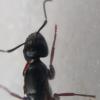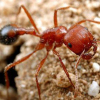Maybe she's eating them then laying more. My Myrmica was doing this last year. I boosted her three worker pupae from a wild nest and finally she got larvae to take into hibernation. The biggest has since eclosed ... and it's a drone. So it looks like she's infertile.
The Myrmica queens i caught months later, during nuptial flight season, started laying after hibernation and all have workers already.
If you can catch another Myrmica queen, maybe they could found together, and the infertile queen could do all the running and fetching.
Hmm, I see, I don't think I could boost her, 1. I don't have the guts to disrupt a nest for brood, and 2. The Myrmica in my yard I'm fairly certain are not the same Myrmica sp. as my queen, thanks to their queen rushing in to greet me ( and try stinging ) when I first stumbled onto them, and I managed to spot small propedal spines on the queen, while my queen has very pronounced propedal spines. Same reason why I can't catch another queen, because it's impossible to ID her without microscope, I don't know if any queen I'd catch would be of the same species.
I hope she is not eating them and laying more, that is my biggest worry, but I try to shield her from any and all stressors, I even hold my breath while looking into her setup.
Reason #2 probably doesn't matter. I see people use brood from other species in the same genera all the time, and I thought I heard about someone using brood from a different genus before as well.
I see, still, I'm not about to disturb a nest.
Anyway, so, this sunday, uh, while feeding I quickly peeped and maybe it's just the light playing tricks on me, but the brood seemed... yellower, should I, and how much, should I be concerned, does it mean the brood is dead?
Edited by NPLT, June 7 2021 - 8:24 AM.




















